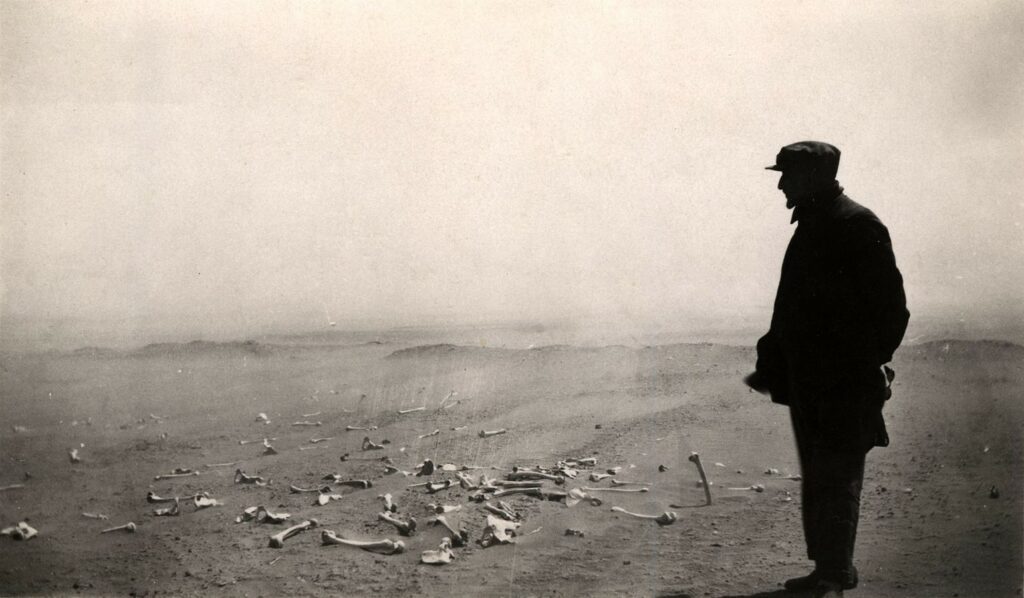Reflections on Genocide as the Ultimate Crime
TRANSCEND MEMBERS, 26 Apr 2021
Richard Falk | Global Justice in the 21st Century – TRANSCEND Media Service
26 Apr 2021 – Subsequent to our article addressing alleged genocide by China against the Uyghur people, President Joe Biden declared the Armenian massacres of 1915 to be an instance of ‘genocide.’ The following paragraph addresses this issue in summary form:
“Biden has added another dimension to the misuse of ‘genocide,’ making another indirect controversial intrusion on past memories and present realities by fulfilling on behalf of the United States Government his campaign pledge to declare what befell the Armenian community in 1915 as ‘genocide’ on April 24, 2021 without bothering to clarify whether this was a legal, political, or moral assessment of events that occurred in the midst of World War I. The Nuremberg Judgment was very clear that for action to legally qualify as an international crime it must have been preceded by the enactment of the relevant legal norm. Otherwise, it is an instance of retroactive criminalization, and cannot validly be prosecuted, however abhorrent. As we know the word ‘genocide’ was a linguistic innovation of the 1940s, and it only became criminalized by the adoption of the Genocide Convention in 1948. For Biden to come along in 2021 and pronounce these events as genocide is again to trivialize this ultimate crime for the sake of domestic political gain and as a way of demeaning Turkey because of some foreign policy differences. If genuinely motivated for historical redress, a responsible approach might have been to call for an independent international inquiry to interpret the events, giving Turkey, as well as representatives of the Armenian community, an opportunity to present its narrative which is more an explanation than a justification.”
APRIL 23, 2021
Reflections on Genocide as the Ultimate Crime
BY ALFRED DE ZAYAS – RICHARD FALK

This photograph depicts the Armenian leader Papasyan seeing what’s left after the horrendous murders near Deir-ez-Zor in 1915-1916.
Photograph Source: Bodil Katharine Biørn – National Archives of Norway – Public Domain
The misuse of the word genocide is disdainful toward relatives of the victims of the Armenian massacres, the Holocaust, the Rwandan genocide – and as well a disservice to both history, law, and the prudent conduct of international relations. We already knew that we were adrift in an ocean of fake news. It is far more dangerous to discover that we are also at risk of being immersed in the turbulent waters of “fake law”. We must push back with a sense of urgency. Such a development is not tolerable.
We thought that Biden’s election would spare us from menacing corruptions of language of the sort disseminated by Donald Trump, John Bolton and Mike Pompeo. We thought that we would no longer be subjected to evidence-free allegations, post-truth and cynical concoctions of fact. It now seems we were wrong.
We recall Pompeo’s bragging about the usefulness of lying, we listened to his incendiary allegations against Cuba, Nicaragua, his outlandish claims that Hezbollah was in Venezuela, his antics on behalf of Trump — all in the name of MAGA.
Donald Trump and Mike Pompeo did not succeed in making America great again. They did succeed in lowering the already low opinion that the world had of America as a country that played by the rules set forth in international. A decisive development in this downward spiral was George W. Bush’s megacrime — the unprovoked invasion and devastation of Iraq, which UN Secretary-General Kofi Annan called an “illegal war” on more than one occasion. We observed Barak Obama’s involvement in the destruction of Libya, given a bitter resonance by Hillary Clinton’s unspeakable words on Qaddafi’s demise uttered with imperial glee: “We came, we saw, he died”. We cannot forget Trump’s criminal economic sanctions and financial blockades punishing whole societies in the midst of a crippling pandemic. These were crimes against humanity committed in our name. Such sanctions reminded us of merciless medieval sieges of towns, aimed at starving whole populations into submission. We think back to the one million civilian deaths resulting from Germany blockading Leningrad 1941-44.
No, to make America great again, it seems perverse to suppose that this can come about by continuing to behave as an international bully, threatening and beating up on entire peoples. No, in order to make America respected and admired in the world we can and should start by reviving the legacy of Eleanor Roosevelt, by rediscovering the spirit and spirituality of the Universal Declaration of Human Rights, and more broadly reenacting the peace-oriented humanism of John F. Kennedy.
We can and should be demanding more from Joe Biden and Antony Blinken. Evidence-free allegations of “genocide” in Xinjiang, China, are unworthy of any country, and most of all, of the country that wants to act as the prime international champion of human rights. Raphael Lemkin would turn in his grave if he learned that the crime of “genocide” has been so crassly instrumentalized to beat the drums of Sinophobia. The sudden flurry of United States interest in the fate of the Uyghur people seems less motivated by compassion or the protection of human rights than lifted from the most cynical pages of the Machiavellian playbook of geopolitics.
Genocide is a well-defined term in international law – in the 1948 Genocide Convention and Article 6 of the Rome Statute.The most respected international tribunals have separately agreed that proof of the crime of genocide depends on an extremely convincing presentation of factual evidence, including documentation of an intent to destroy in whole or in part national, ethnic, racial or religious group. The International Criminal Tribunal for the former Yugoslavia, the International Criminal Tribunal for Rwanda, the International Court of Justice – all have endeavoured to provide authoritative tests of “intent,” treating intent as the essential element in the crime of genocide. This jurisprudence is what should be guiding our politicians in reaching prudent conclusions as to whether there exist credible grounds to put forward accusations of genocide, given its inflammatory effects. We should be asking whether the factual situation is clouded, calling for an independent international investigation followed by further action if deemed appropriate, and in nuclear-armed world, we should be extremely careful before making such an accusation.
Mike Pompeo’s allegation that China was committing genocide in Xinjiang was unsupported by even a hint of evidence. It was a particularly irresponsible example of ideological posturing at its worst, and besides, an embrace of reckless geopolitics. That is why it is so shocking to us that the 2021 US State Department Human Rights Report repeats the “genocide” charge in its Executive Summary, yet doesn’t even bother to mention such a provocative charge in the body of the report. This is an irresponsible, unreasonable, unprofessional, counter-productive, and above all, dangerously incendiary allegation, which could easily spiral out of control if China should choose to respond in kind. China would be on firmer ground than Pompeo or the State Department if it were to accuse the United States of “continuing genocide” against the First Nations of the Americas, Cherokees, Sioux, Navajo, and many other tribal nations. We can only imagine the angry backlash if it hadbeen China that had been the first to put forward loose talk about genocide.
By making non-substantiated claims the U.S. Government is seriously undermining its own authority and credibility to revive its role as global leader. To play this constructive international role is not on display by “weaponizing” human rights against China – or Russia. Instead, a foreign policy dedicated to the genuine promotion of human rights would call for international cooperation in conducting reliable investigations of gross violations of human rights and international crimes, wherever they occur – whether it be in India, Egypt, China, Russia, Turkey, Saudi Arabia, Myanmar, Yemen, Brazil, Colombia. We would hope that Biden’s Washington is confident enough to be even receptive to investigations undertaken in response to allegations of violations against the United States of America and its closest allies in Europe and elsewhere.
The Orwellian corruption of language by U.S. Government officials, the double-standards, the dissemination of fake news by the mainstream media, including the “quality press” and CNN, self-anointed as “the most trusted name in news” are eroding our self-respect. Indeed, the manipulation of public opinion undermining our democracy as we succumb to the exaggerations of the wrongs of others that give an added bite to hostile propaganda, and are leading the world to the very edge of a forbidding geopolitical precipice, and in the process, heightening the prospects of a new cold war – or worse.
The Biden Administration at the very least should show respect for the American people and for international law by stop cheapening the meaning of the word “genocide” and cease treating human rights as geopolitical tools of conflict. Such irresponsible behavior may soothe the nerves of Trumpists, and fashion a façade of unity based on portraying China as the new ‘evil empire,’ but it’s a foreign policy ploy that should be rejected as it seems a recipe for global disaster.
__________________________________________
 Richard Falk is a member of the TRANSCEND Network, an international relations scholar, professor emeritus of international law at Princeton University, Distinguished Research Fellow, Orfalea Center of Global Studies, UCSB, author, co-author or editor of 60 books, and a speaker and activist on world affairs. In 2008, the United Nations Human Rights Council (UNHRC) appointed Falk to two three-year terms as a United Nations Special Rapporteur on “the situation of human rights in the Palestinian territories occupied since 1967.” Since 2002 he has lived in Santa Barbara, California, and associated with the local campus of the University of California, and for several years chaired the Board of the Nuclear Age Peace Foundation. His most recent book is On Nuclear Weapons, Denuclearization, Demilitarization, and Disarmament (2019).
Richard Falk is a member of the TRANSCEND Network, an international relations scholar, professor emeritus of international law at Princeton University, Distinguished Research Fellow, Orfalea Center of Global Studies, UCSB, author, co-author or editor of 60 books, and a speaker and activist on world affairs. In 2008, the United Nations Human Rights Council (UNHRC) appointed Falk to two three-year terms as a United Nations Special Rapporteur on “the situation of human rights in the Palestinian territories occupied since 1967.” Since 2002 he has lived in Santa Barbara, California, and associated with the local campus of the University of California, and for several years chaired the Board of the Nuclear Age Peace Foundation. His most recent book is On Nuclear Weapons, Denuclearization, Demilitarization, and Disarmament (2019).
Alfred de Zayas is a lawyer, writer, historian, expert in the field of human rights and international law and retired high-ranking United Nations official.
Go to Original – richardfalk.org
Tags: Armenia, Genocide, Genocide Convention, Holocaust, Native Americans, Palestinians, Rwanda
DISCLAIMER: The statements, views and opinions expressed in pieces republished here are solely those of the authors and do not necessarily represent those of TMS. In accordance with title 17 U.S.C. section 107, this material is distributed without profit to those who have expressed a prior interest in receiving the included information for research and educational purposes. TMS has no affiliation whatsoever with the originator of this article nor is TMS endorsed or sponsored by the originator. “GO TO ORIGINAL” links are provided as a convenience to our readers and allow for verification of authenticity. However, as originating pages are often updated by their originating host sites, the versions posted may not match the versions our readers view when clicking the “GO TO ORIGINAL” links. This site contains copyrighted material the use of which has not always been specifically authorized by the copyright owner. We are making such material available in our efforts to advance understanding of environmental, political, human rights, economic, democracy, scientific, and social justice issues, etc. We believe this constitutes a ‘fair use’ of any such copyrighted material as provided for in section 107 of the US Copyright Law. In accordance with Title 17 U.S.C. Section 107, the material on this site is distributed without profit to those who have expressed a prior interest in receiving the included information for research and educational purposes. For more information go to: http://www.law.cornell.edu/uscode/17/107.shtml. If you wish to use copyrighted material from this site for purposes of your own that go beyond ‘fair use’, you must obtain permission from the copyright owner.

[…] Reflections on Genocide as the Ultimate Crime […]